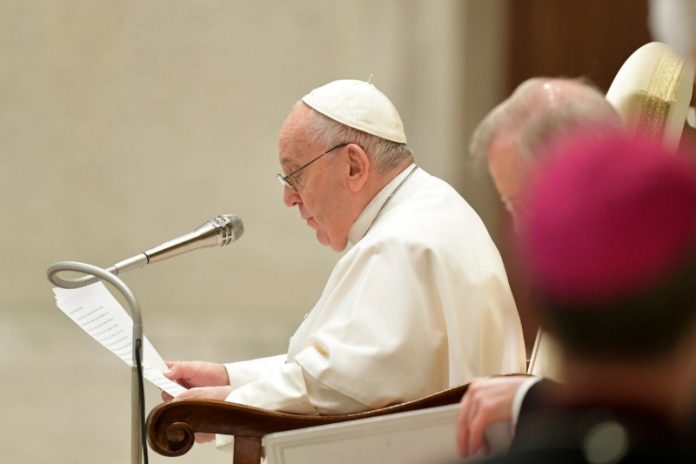Pope Francis said on Wednesday that the “rhetoric of inclusion” alone is not enough to forge a true “culture of social tenderness.”
In his general audience address on March 30, the pope described “inclusion” as “the ritual formula of every politically correct discourse.”
But he said that invoking “inclusion” did not guarantee a “real correction” of the tendency to marginalize society’s frailest members.
“Certainly, the rhetoric of inclusion is the ritual formula of every politically correct discourse. But it still does not bring about a real correction of the practices of normal co-existence: a culture of social tenderness struggles to grow,” he said.
“No: the spirit of human fraternity — which I felt it was necessary to relaunch forcefully — is like a discarded garment, to be admired, yes, but … in a museum. We lose human sensitivity, we lose these movements of the spirit that make us human.”
The pope was speaking in the Vatican’s Paul VI audience hall on March 30 during his fifth live-streamed catechesis on old age, part of a series he launched in February.
He focused on the story in St. Luke’s Gospel of the encounter between two elderly figures, Simeon and Anna, and the Child Jesus.
“Simeon knows, by a premonition of the Holy Spirit, that he will not die before seeing the Messiah. Anna attends the temple every day, devoting herself to his service,” he observed.
“Both of them recognize the presence of the Lord in the Child Jesus, who fills their long wait with consolation and reassures them as they bid farewell to life.”
The pope said that a lifetime of patient waiting for God had sharpened Simeon and Anna’s spiritual senses.
“Today we need this more than ever: we need an old age gifted with lively spiritual senses capable of recognizing the signs of God, or rather, the Sign of God, who is Jesus,” he commented.
The pope warned pilgrims that contemporary society was suffering from an “anesthesia of the spiritual senses.”
“The anesthesia of the spiritual senses — and this is ugly — in the excitement and stultification of those of the body, is a widespread syndrome in a society that cultivates the illusion of eternal youth, and its most dangerous feature lies in the fact that it is mostly unconscious,” he said.
“We do not realize we are anesthetized. And this happens: it has always happened and it happens in our times.”
He explained that this “anesthesia” did not mean simply that people no longer thought of God or religion.
“The insensitivity of the spiritual senses relates to compassion and pity, shame and remorse, fidelity and devotion, tenderness and honor, one’s own responsibility and sorrow for another,” he said.
The pope added that old age was “the first casualty of this loss of sensitivity.”
“In a society that exercises sensitivity primarily for enjoyment, there cannot but be a lack of attention to the frail, and the competition of the winners prevails,” he said.
He suggested that the story of Simeon and Anna showed a way out of generational conflict, noting that they were not resentful that they were only “witnesses” and not “protagonists.”
“Old age that has cultivated the sensitivity of the soul extinguishes all envy between generations, all resentment, all recrimination for an advent of God in the generation to come, which arrives together with the departure of one’s own,” he said.
He continued: “The spiritual sensitivity of old age is capable of breaking down competition and conflict between generations in a credible and definitive way…”
“This is certainly impossible for men, but it is possible for God. And today we need it so much, the sensitivity of the spirit, the maturity of the spirit, we need wise elders, mature in the spirit who give us hope for life.”
After the pope’s address, a summary of his catechesis was read out in seven languages and he greeted members of each language group.
Addressing English-speaking Catholics, he said: “I greet the English-speaking pilgrims and visitors taking part in today’s audience, especially the groups from England, Denmark, the Netherlands, Sweden, Israel, and the United States of America.”
“May our Lenten journey bring us to celebrate Easter with hearts purified and renewed by the grace of the Holy Spirit. Upon each of you, and your families, I invoke joy and peace in Christ our Redeemer.”
Speaking to Italian pilgrims, Pope Francis greeted Ukrainian children present at the audience who are being hosted by the Aiutiamoli a Vivere foundation, the Puer association, and Ukraine’s embassy to the Holy See.
“And with this greeting to the children, we also return to think about this monstrosity of war and renew our prayers that this savage cruelty that is war may be stopped,” he said.
At the end of the audience, Pope Francis asked for prayers ahead of his upcoming two-day visit to Malta, a predominantly Catholic country located in the central Mediterranean Sea.
“Dear brothers and sisters, next Saturday and Sunday I shall go to Malta. In that luminous land, I shall be a pilgrim in the footsteps of the Apostle Paul, who was welcomed there with great humanity after being shipwrecked at sea on his way to Rome,” he said.
“This apostolic journey will thus be an opportunity to go to the sources of the proclamation of the Gospel, to know at first hand a Christian community with a lively history stretching back thousands of years, and to meet the inhabitants of a country that lies at the center of the Mediterranean and in the south of the European continent, which today is even more committed to welcoming so many brothers and sisters seeking refuge.”
“I greet all of you Maltese from the bottom of my heart: have a good day. I thank all those who have worked to prepare this visit and I ask each one to accompany me in prayer.”









